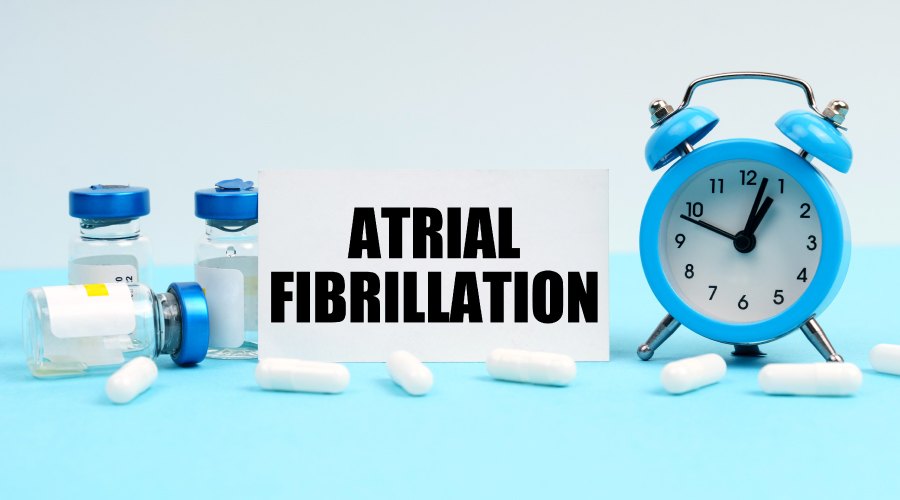

Atrial fibrillation (AFib) is a condition of irregular heartbeat that starts in the heart’s upper chamber. This condition can cause various symptoms, such as weariness, dizziness, and an accelerated heartbeat. It is also a very common kind of arrhythmia. However, it is very risky if untreated. Lets give you more details about the types of AFib, diagnosis, treatment, and tips to prevent this attack.
What is Atrial Fibrillation?
AFib, or atrial fibrillation, is an often very fast and irregular heart rhythm which is known as arrhythmia. It can lead to severe blood clots in the heart. This medical condition can also increase the chances of heart failure, stroke, and other heart-related issues.
When a person suffers from AFib, their heart’s upper chamber, called atria, beats irregularly and chaotically. It doesn’t beat in sync with the lower heart chambers – ventricles. These episodes may come often or even stay permanent. However, it is a severe condition that should not be ignored. People with AFib may also suffer from atrial flutter, another heart rhythm problem.
Atrial Fibrillation Symptoms
A lot of people have no symptoms of AFib. However, it may cause the following:
- Fast heartbeat
- Pounding heartbeat
- Light-headedness
- Shortness of breath
- Tiredness
- Heart palpitations
- Chest pain
- Skipping sensation in the chest.
You should not disregard chest pressure or pain; instead, you should get medical attention immediately. This might indicate a heart attack.
Atrial Fibrillation Causes
This heart condition is often the result of changes happening in the heart’s tissue or disruptions in the electrical signalling that regulates the rhythm of the heart.
Atrial Fibrillation Treatment
Listed below are some treatment options for AFib:
- Medicines
- Therapy to help the heart beat regularly
- Procedures to block faulty heart signals.
Medicines help in reducing the chance of stroke while controlling your heartbeat. The treatment plan will also depend on different factors, such as:
- Your overall health
- Age
- Type of AFib
- Symptoms
- Any other underlying medical condition.
Treatment plans will only start once the doctor can figure out the cause of AFib. In case the doctor is unable to determine the cause, the treatment plan will be:
- Medicine to prevent stroke
- Pacemaker fitted to your heart
- Medicine to control AFib
- Electric shock treatment
- Catheter ablation.
Different Types of AFib
There are different kinds of AFib that are explained below:
- Paroxysmal AFib – This AFib is occasional and stops itself within seven days.
- Persistent AFib – This AFib lasts longer than seven days and may require a person to undergo cardioversion, which is an electric shock to the heart to restore a normal heartbeat.
- Long-standing Persistent AFib – It is also very similar to the second one but lasts longer than one year.
- Permanent AFib – This condition lasts for an indefinite period, and the doctor may suggest not restoring a normal heartbeat.
- Nonvalvular AFib – A heart valve issue does not cause this AFib.
Paroxysmal AFib can convert into permanent or chronic AFib over some time as it becomes more frequent and long-lasting. Also, remember that every kind of AFib is high risk and can lead to stroke. People with no symptoms of AFib but the illness in itself are five times more likely to have a heart attack than normal people.
Diagnosis of AFib
AFib will not show any significant symptoms besides irregular heartbeat and tiredness. The best way to know if you are suffering from AFib is to get a regular check-up done. Your doctor can listen to your heartbeat and check your pulse to determine whether they are normal or not. They may ask you to undergo an ECG if they find any concern.
ECG or electrocardiogram helps in deciding whether AFib is causing an irregular heartbeat or if there is any other medical condition.
Tips to Prevent an AFib Attack
AFib can happen to the person dealing with it at any time. Even though you will be asked to take regular medications, here are a few things that may help you prevent it:
- Exercise
- Stay hydrated
- Avoid alcohol
- Limit sodium
- Start with yoga
- Go for acupuncture
- Try deep belly breath
- Eat potassium-rich diet
- Limit your caffeine intake
- Opt for a heart-friendly diet
- Keep your head in cold water
- Add magnesium supplement to your diet
- Try the Valsalva manoeuvre – a breathing technique.
Conclusion
In conclusion, atrial fibrillation is a severe cardiac disorder that disrupts normal heart rhythm. While natural remedies, home treatments, and lifestyle changes can help manage this condition, following your doctor’s advice is crucial, as well as avoiding any actions that could have serious repercussions. Always prioritise medical guidance to ensure safe and effective management of atrial fibrillation.




